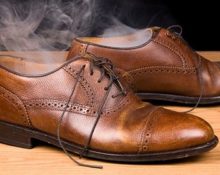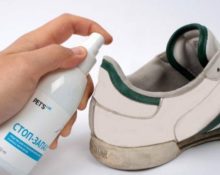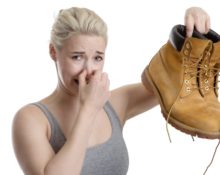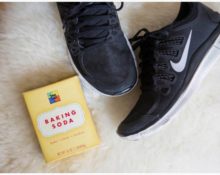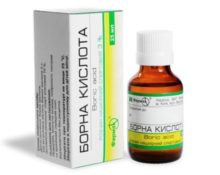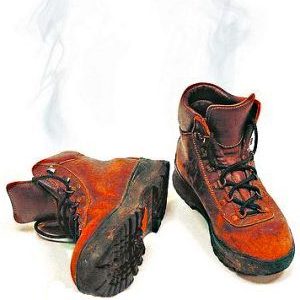 How carefully and seriously we approach the choice of shoes - they must be of high quality, well-tailored, beautiful and comfortable. True, it is impossible to assess in advance whether shoes are capable of emitting an unpleasant odor. And often this is precisely the reason to get rid of your favorite and so comfortable pair of shoes or boots. There is no need to rush and take them to the trash bin - there are many ways to remove unpleasant odor from boots, regardless of what caused it.
How carefully and seriously we approach the choice of shoes - they must be of high quality, well-tailored, beautiful and comfortable. True, it is impossible to assess in advance whether shoes are capable of emitting an unpleasant odor. And often this is precisely the reason to get rid of your favorite and so comfortable pair of shoes or boots. There is no need to rush and take them to the trash bin - there are many ways to remove unpleasant odor from boots, regardless of what caused it.
How to remove unpleasant odor from shoes
Shoe odor can seriously ruin your life. In addition to the fact that when you take off your shoes at home, the apartment will be filled with a stinking aroma, you can also forget about going on a visit forever. Sometimes shod feet begin to emit an unpleasant odor when exposed to heat - a stove blowing onto the feet in a car or standing near a radiator or heater in the office. It turns out that it is almost impossible to “hide” the fact that a dubious aroma is coming from the shoes.But before getting rid of the effect, you need to understand the cause.
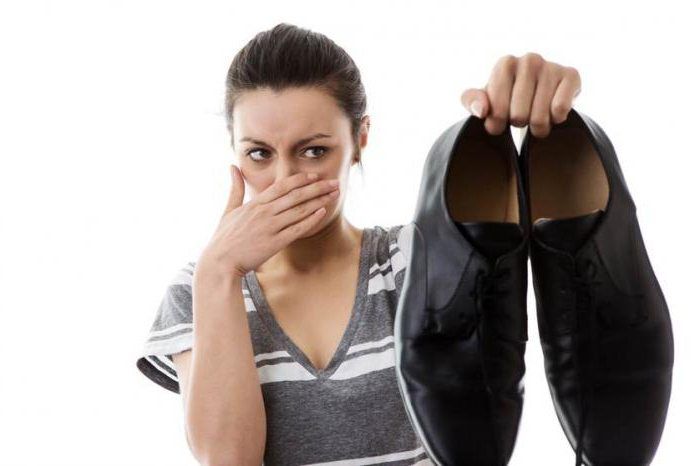
What can cause an unpleasant odor in boots:
- Sweaty feet. You need to understand that sweat itself has no odor. An unpleasant odor occurs when moisture (sweat) begins to interact with microorganisms in shoes. And there are enough places for them to live - seams, insoles. This process can be enhanced by air obstruction - this is what most cheap products suffer from.
- "Fragrant" materials used in the production of boots. Interaction with moisture and warm air can cause glue, leatherette or some polymers to emit a terrible odor.
- Improper care can easily cause odor. When purchasing shoes, do not throw away all the instructions included in the box. Depending on the materials and subtleties of production, different care is recommended for different shoes, and not what is usual for us;
- Wearing shoes out of season – a funny reason, but it still happens. When making boots, a material is used that is suitable for certain environmental conditions. And if light, demi-season boots are worn in severe winter, the material can “echo” with a terrible smell.
- Animals in the house can also “influence” unpleasant foot odor. This is especially common for small kittens or adult cats. Cat urine is very corrosive and has an intense odor.
IMPORTANT! To get rid of unpleasant odors, you should not wash your shoes! It is guaranteed to be deformed, but the smell will still remain, especially if the causes of its occurrence have not been identified.
Even after studying and taking into account all the above reasons, you can still have shoes with an unpleasant “aroma” in your closet. At the same time, the age of these shoes is unimportant - Both new and worn shoes can smell unpleasant.
What to process
They try to “neutralize” everything that has an unpleasant odor in a simple way - wash or clean it. But shoes won’t allow such measures, so you’ll have to look for a more cunning way out. Tips and recommendations for getting rid of stink in boots can be divided into the use of special means or the help of folk recipes.
Special means
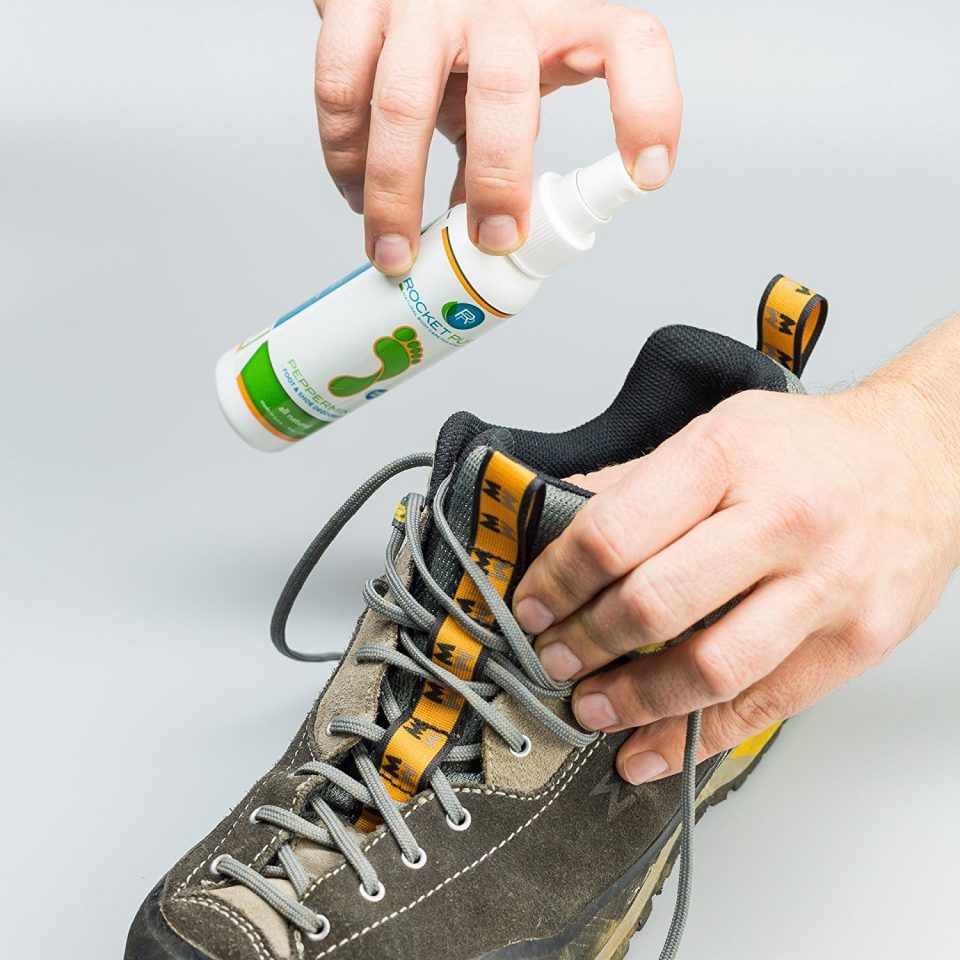 Huge amounts of money are spent every day on developing products that will help restore a pleasant fragrance to shoes. Today, deodorants for shoes, ointments and gels for feet, gels and substances for absorbing moisture, and special insoles are produced. All products can be sold not only in pharmacies, but also in regular stores.
Huge amounts of money are spent every day on developing products that will help restore a pleasant fragrance to shoes. Today, deodorants for shoes, ointments and gels for feet, gels and substances for absorbing moisture, and special insoles are produced. All products can be sold not only in pharmacies, but also in regular stores.
What they can do, how they operate and how to use “special artillery”:
- Deodorants. The main action, like any deodorant, is to spread a pleasant smell. Perhaps “overpowering” the stench with the scent of flowers is not the best idea. Some manufacturers equip their cans with antibacterial action - then there is a chance to destroy those microorganisms that cause odor in shoes. Deodorants can be used both by directing them into shoes and by treating the feet themselves. The form of release of deodorants varies - they can be sprays or sticks. The latter are not very convenient to use.
- Insoles. There are a lot of options - disposable, impregnated with antifungal compounds, having a layer of activated carbon, made from natural materials. The advantage of insoles is that they can be worn for many days. You may forget to treat your shoes with deodorant, but the insoles are always inside. True, some models need to be ventilated daily.
- Dry substances or gels that can absorb moisture. These bags are always placed in shoe boxes. They contain silica gel, which absorbs both moisture and unpleasant odors. Walking with such bags in your legs is not very convenient, so you need to look for specialized release forms.
The methods listed above will help deal with the smell that has just appeared. If the “aroma” in the shoes is a long-time companion, you must first subject the shoes to treatment, trying to find and neutralize the cause of the smell. Here it is better to use popular advice.
Folk remedies
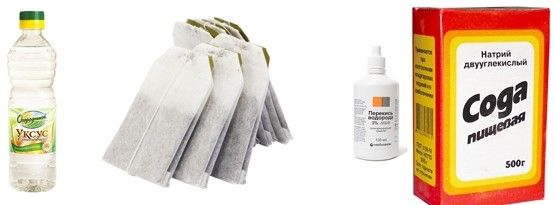
Before listing folk remedies for odor in shoes, it is worth considering cleaning methods. For example, if the smell in your shoes is caused by a naughty kitten, a number of actions are needed:
- Wash shoes with a solution of laundry soap.
- Make a weak solution of potassium permanganate, moisten a cotton pad and wipe the boots on all sides, inside and out.
- Dilute vinegar 50/50 with water and carry out another processing step.
- The boots should be opened as much as possible and allowed to dry.
If after this treatment the smell does not disappear, it is necessary to repeat the procedure.
IMPORTANT! Not getting rid of the smell of your pet's urine enough will attract it again and again. It is better to protect your shoes with special sprays for animals, which repel the desire to “harm.”
Hydrogen peroxide, potassium permanganate, vinegar and soda are used as an antimicrobial treatment for boots. For the entire procedure, dilute the solutions, wash the shoes with a cotton pad and leave to dry.
The following solutions can be prepared:
- 2 grams of manganese per 1 liter of water.
- Pure hydrogen peroxide.
- Vinegar and water in a 1:1 ratio.
- Soda is used insoluble, in dry form.
- Alcohol can also be used undiluted.
When the primary steps for treating boots have been completed, you can begin measures to eliminate odor and impart a pleasant aroma. The following can help with this:
- Lemon juice and lavender oil. You can put a couple of drops of the product on each insole. They will get rid of bacteria and freshen your boots.
- Tea bag. You can wipe the inside of your shoes with a moistened and used bag.
- Dried herbs - sage, mint, eucalyptus, oak bark. They can be poured inside the boot and left overnight.
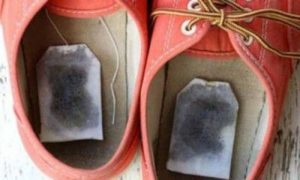
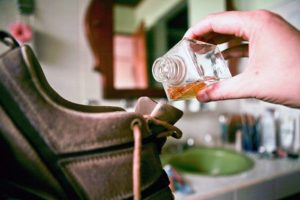
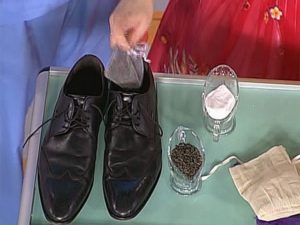
ADVICE! When the season ends and the boots need to be put away until next time, it is important to put them in order, dry them and put in silica gel bags. Even in a passive position, while in a closet, boots are susceptible to moisture.
Prevention: what to do to prevent boots from stinking
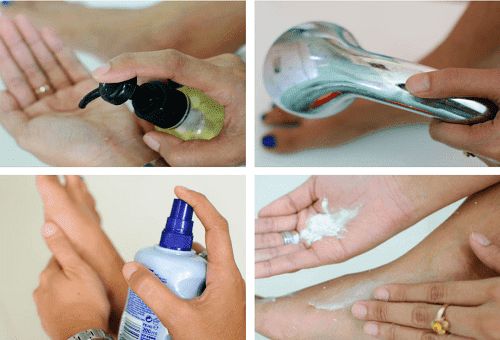
Getting rid of odor in shoes is much more difficult than simply preventing its occurrence. Regular implementation of recommendations will very quickly develop into useful habits:
- Do not put on boots while wearing stale socks.
- Even if you get caught in light rain, you need to dry your boots.
- When washing your feet, thoroughly rinse the areas between your toes.
- Do not buy cheap socks made from artificial and non-breathable fabrics.
- Pay attention to your insoles and change them whenever possible.
- Care for your boots using water-repellent products.
- Use special shoe dryers.
- Freezing for a day in the freezer of the refrigerator will help neutralize germs and prevent the appearance of an unpleasant odor (do not carry out a similar procedure with patent leather shoes).

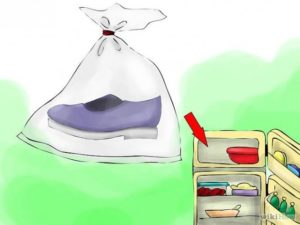
Shoes that are properly selected, sized and made from natural materials can last for many years. It’s a shame if one dirty sock or rainy evening causes such shoes to “reward” with an unpleasant odor.Therefore, basic hygiene rules and careful handling of shoes should simply become a way of life.


 0
0
